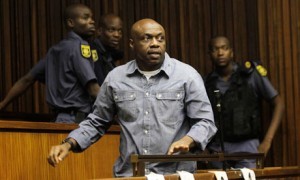A South African court has finally convicted Henry Okah of 13 terrorism charges, including masterminding the October 1, 2010 multiple bomb blasts in Abuja which killed no fewer than 12 people.

Okah who denied all the charges against him saying they were politically motivated will now face a minimum term of life in prison when the court sentences him on February 1.
The trial Judge, Nels Claassen, who handed down the verdict in the South Gauteng High Court yesterday, held that the state proved beyond reasonable doubt that Okah was guilty.
“I have come to the conclusion that the state proved beyond reasonable doubt the guilt of the accused,” said Judge Nels Claassen.
The conviction came even as the trial of others linked in the bombing including Henry’s elder brother Charles Okah has been dragging in a Federal High Court in Abuja.
Apart from the Abuja bombing, Okah was found guilty of masterminding two explosions in March 2010 in Warri, in Delta state which is a major hub of the oil-rich Niger Delta region.
Okah who was arrested in Johannesburg, South Africa a day after the Abuja bombing, he has been previously arrested for gun-running charges in Angola in 2007 and then transferred to Nigeria but never convicted having been released after two years under an amnesty for oil militants. The Movement for the Emancipation of the Niger Delta (MEND), a group fighting for a greater share of the Delta oil wealth, claimed responsibility for the attacks and Okah was apprehended for charges of leading the group.
Okah however denied leading MEND, but had said he sympathised with their goals. He alleged that President Goodluck Jonathan was behind the bombing so as to curry public sympathy ahead of the 2011 presidential election.
The South African court however held that Okah was the leader of the movement after uncovering documentary evidence including his wife’s handwritten notes.
He was convicted of being a spokesman for MEND and threatening to disrupt South African businesses in Nigeria, including kidnapping its workers.
The court said Okah, who has been living in South Africa since 2003 and granted permanent residency in 2007 returned to Nigeria in early 2010 during which he sponsored the purchase of cars which were modified to allow the fitting of explosive devices.
It held that months later the cars were used to bomb independence day festivities that were attended by several foreign heads of state.
About 30 witnesses were flown in from Nigeria to testify in the case, including the Minister of Niger Delta Affairs Godsday Orubebe.
Nigerian police had described him as “an international gun-runner and a major oil bunkerer (thief) in the Niger Delta.”
South Africa said it arrested and tried him as a signatory to international laws on terrorism as well as on the back of a UN resolution urging nations to prevent and suppress acts of terrorism.
Meanwhile, the trial of his elder brother, Charles for alleged involvement in the Abuja bombing is still dragging at the Federal High Court Abuja.
The court is however expected to on Friday deliver judgment on charges of treasonable felony preferred by the State Security Service (SSS) against another suspect, Edmund Ebuware who is standing trial, along with Charles Okah for allegedly hiding information on the motive those behind the bombing.
The court had on May 3 last year granted his request and removed Ebuware from the list of suspects charged with the Independence bombing and listed him for independent trial. Others charged with the bombing are Obi Nwabueze and Tiemkemfa Osuvwo who has died in Kuje Prison, Abuja
Reacting to the judgment, Lagos lawyer Festus Keyamo who is also counsel to Charles Okah condemned Henry’s conviction. He described it as politically motivated and legally incorrect saying South Africa wanted to please Nigerian government at all cost.
Keyamo said in a statement: “The fundamental flaw in the trial is that Henry Okah was not given adequate facilities and the opportunity to defend himself. This is because after the prosecution closed its case in South Africa, the defence attorneys and my Chambers here in Abuja tried frantically to summon the witnesses of Henry Okah who are based here in Nigeria to testify on his behalf. These witnesses include some government officials.
“In this regard, we wrote to the Attorney General of the Federation who replied and directed that Henry’s counsel in South Africa apply to the court there for an order to secure the legal assistance of the Attorney-General of Nigeria. This was only two weeks ago.
“Without giving Henry’s counsel in South Africa adequate time and facilities to follow the directives, the South African court foreclosed his opportunity to call witnesses and rushed to convict him. This is a breach of his fundamental right to fair hearing and an obvious attempt by the South African authorities to please Nigeria at all cost. That is why the judgment is nothing but political.
“Whilst all Nigerians empathise with those who lost their lives and limbs in the October 1, 2010 bombing, it is wrong to convict anybody for it without due process. Henry has been convicted without due process,” he said.
Calling on Nigerians and the international community to reject the conviction, Keyamo said Okah’s offence was “his refusal to accept the so-called amnesty offered by the Yar’Adua-Jonathan administration and his insistence on the Niger-Delta controlling its resources.”